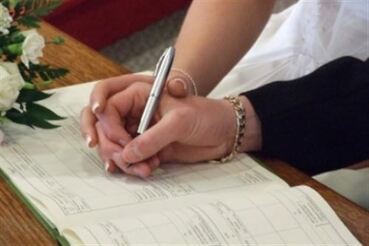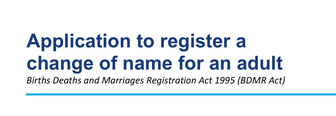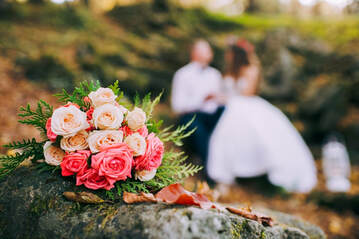
I've recently been posting about traditions which have been changing, some for very good reasons. Many of our wedding traditions originated in a patriarchal age when a woman was regarded as her father's "property" until she was "given away" to her husband at the wedding. I've already written about how the traditional "giving away" is changing (or gone forever), and how we can take that opportunity to create new meaningful ways of acknowledging significant people at a wedding ceremony.
I received a message a few days ago seeking my ideas about the custom of asking a bride's father (or parents) for permission to marry his/their daughter, and what should a couple do with that tradition now. On the one hand, we might think (and rightly so) that an adult who is old enough to vote for a Government, sit on a jury and make decisions about someone's life, and serve in the armed forces and defend their country, should also be capable of making an important decision about their own life without a parent's permission! But on the other hand, parents often play a huge part in helping someone grow to maturity and to the point where they are capable of making that decision, and it may be good to acknowledge that relationship. And you probably want to maintain a good relationship with the future in-laws and get their 'blessing'. Family relationships can also be complex, not everyone is close to their parents, and you may not want to put yourself in the situation where a parent could say 'no.' Tricky. So what should you do?
Here are two examples, from my own personal experience. When I proposed to my then-future-wife, and she accepted, I reckoned that hers was the only permission I needed and was taken a little aback when she asked "so when are you going to ask Dad?" I got around my problem by meeting with my fairly traditionalist future father-in-law and letting him know how much I loved his daughter, how we planned to have a great life together, and that we had decided to get married. He was delighted (naturally!) and in the ensuing excitement he probably didn't even notice that I didn't ask for his permission.
My second example is from the 'other' perspective - as the potential father-in-law. I had a pretty good idea what was about to happen when my eldest daughter's boyfriend invited me to lunch (they say there's no such thing as a free lunch, so I expected it was going to cost me something). I made him sweat for quite a while, discussing work, politics, the economy, you-name-it. Eventually he plucked up enough courage to interrupt me and change the subject, and asked for permission to marry my daughter. I said he didn't need my permission, but I was delighted they'd come to that decision themselves and they would definitely have our support and blessing.
I doubt very much if many parents these days expect to be asked for permission for a son or daughter to marry, and in many cases they will have already seen the love blossoming between you, but it's nice for them to be included in the process of their son/daughter creating a new family . Depending on your family circumstances, weddings can be a time to celebrate family and to acknowledge all the important people in your lives. Meeting with yours and your partner's parents to announce your plans can be one of the 'special moments' which you may later treasure. Every family is different and there is no one 'rule' that will suit every family situation. If your partner has a good relationship with his or her family, and you want to involve them in the wedding and in your married lives thereafter, it would probably be a good idea to make some kind of a fuss about how you announce your marriage plans to them. So in my opinion, and it's just my opinion, you don't need to ask your partner's parents for permission but they will probably be very honoured if you pay them a special visit (or invite them to a special lunch) to make your announcement.
I received a message a few days ago seeking my ideas about the custom of asking a bride's father (or parents) for permission to marry his/their daughter, and what should a couple do with that tradition now. On the one hand, we might think (and rightly so) that an adult who is old enough to vote for a Government, sit on a jury and make decisions about someone's life, and serve in the armed forces and defend their country, should also be capable of making an important decision about their own life without a parent's permission! But on the other hand, parents often play a huge part in helping someone grow to maturity and to the point where they are capable of making that decision, and it may be good to acknowledge that relationship. And you probably want to maintain a good relationship with the future in-laws and get their 'blessing'. Family relationships can also be complex, not everyone is close to their parents, and you may not want to put yourself in the situation where a parent could say 'no.' Tricky. So what should you do?
Here are two examples, from my own personal experience. When I proposed to my then-future-wife, and she accepted, I reckoned that hers was the only permission I needed and was taken a little aback when she asked "so when are you going to ask Dad?" I got around my problem by meeting with my fairly traditionalist future father-in-law and letting him know how much I loved his daughter, how we planned to have a great life together, and that we had decided to get married. He was delighted (naturally!) and in the ensuing excitement he probably didn't even notice that I didn't ask for his permission.
My second example is from the 'other' perspective - as the potential father-in-law. I had a pretty good idea what was about to happen when my eldest daughter's boyfriend invited me to lunch (they say there's no such thing as a free lunch, so I expected it was going to cost me something). I made him sweat for quite a while, discussing work, politics, the economy, you-name-it. Eventually he plucked up enough courage to interrupt me and change the subject, and asked for permission to marry my daughter. I said he didn't need my permission, but I was delighted they'd come to that decision themselves and they would definitely have our support and blessing.
I doubt very much if many parents these days expect to be asked for permission for a son or daughter to marry, and in many cases they will have already seen the love blossoming between you, but it's nice for them to be included in the process of their son/daughter creating a new family . Depending on your family circumstances, weddings can be a time to celebrate family and to acknowledge all the important people in your lives. Meeting with yours and your partner's parents to announce your plans can be one of the 'special moments' which you may later treasure. Every family is different and there is no one 'rule' that will suit every family situation. If your partner has a good relationship with his or her family, and you want to involve them in the wedding and in your married lives thereafter, it would probably be a good idea to make some kind of a fuss about how you announce your marriage plans to them. So in my opinion, and it's just my opinion, you don't need to ask your partner's parents for permission but they will probably be very honoured if you pay them a special visit (or invite them to a special lunch) to make your announcement.



 RSS Feed
RSS Feed